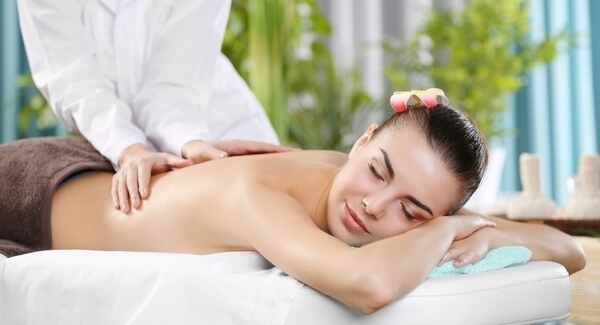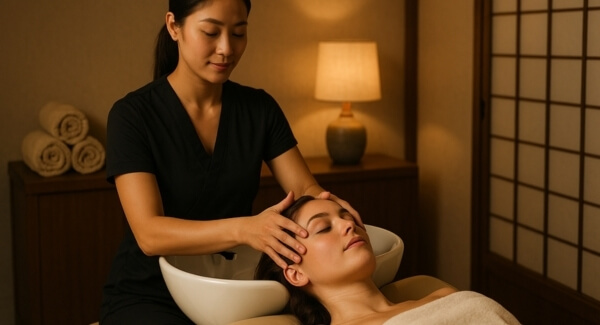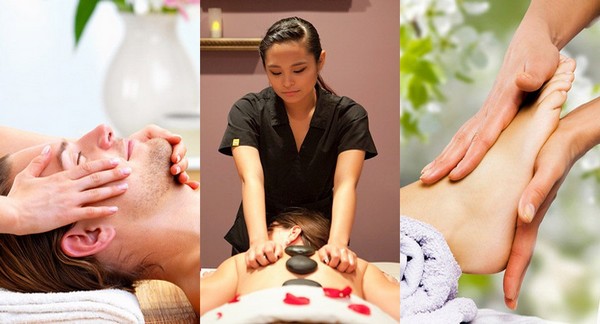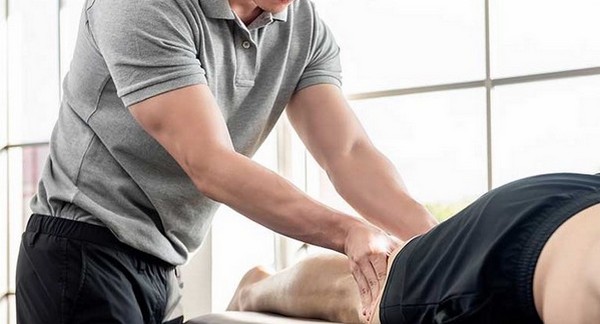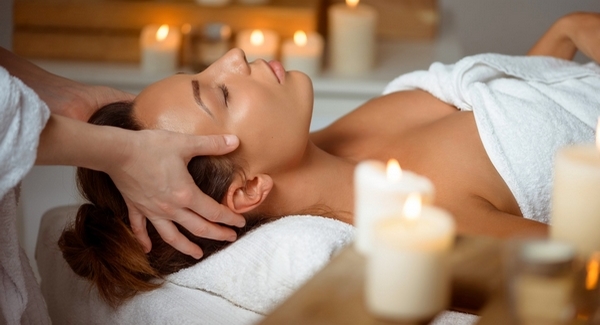Massage therapy for anxiety and stress relief has emerged as one of the most scientifically-validated approaches to mental wellness, offering evidence-based benefits that extend far beyond simple relaxation. In our increasingly demanding modern world, where chronic stress and anxiety affect millions across the UK, therapeutic massage provides a natural, non-pharmaceutical intervention that can significantly improve mental health outcomes.
Research consistently demonstrates massage therapy's ability to reduce stress hormones, activate the parasympathetic nervous system, and increase production of mood-enhancing neurotransmitters. This comprehensive approach to mental wellness makes massage an invaluable tool for managing anxiety, improving emotional resilience, and supporting overall psychological well-being throughout the United Kingdom.
Evidence-Based Mental Health Benefits Research
- Anxiety Reduction: 57% greater anxiety reduction compared to active control treatments in clinical studies
- Cortisol Decrease: Average 31% reduction in stress hormone levels following massage therapy sessions
- Neurotransmitter Enhancement: 28% increase in serotonin and 31% increase in dopamine production post-treatment
- Heart Rate Benefits: Consistent single-session reductions in heart rate and physiological stress markers
- Depression Support: Significant improvements in symptoms of depression and mood disorders through regular treatment
- Sleep Quality Enhancement: Improved sleep patterns and reduced mental fatigue through stress hormone regulation
- Clinical Validation: Over 25 peer-reviewed studies demonstrating measurable stress reduction and mental health benefits
Massage as a Mental Wellness Tool
Addressing Modern Stress and Mental Health Challenges
Contemporary life in the UK presents unprecedented levels of stress through demanding work schedules, financial pressures, social media overwhelm, and the lingering effects of global uncertainties. These chronic stressors contribute to widespread anxiety disorders, depression, and mental health challenges that require effective, accessible interventions.
The Mental Health Crisis Context:
- Anxiety Prevalence: Anxiety disorders affect more than 18% of UK adults annually, creating enormous personal and societal costs
- Depression Statistics: Over 8% of British adults experience depression, with many seeking non-pharmaceutical treatment options
- Workplace Stress: Chronic occupational stress affects millions of UK workers, contributing to burnout and mental health deterioration
- Healthcare Burden: Mental health conditions represent significant NHS resource allocation, highlighting the need for effective preventive interventions
- Treatment Accessibility: Long waiting lists for psychological services create demand for immediate, evidence-based stress relief options
Massage Therapy as Scientific Intervention:
- Evidence-Based Approach: Extensive peer-reviewed research validates massage therapy's effectiveness for anxiety and stress reduction
- Physiological Mechanisms: Measurable changes in stress hormones, neurotransmitters, and nervous system function
- Immediate Benefits: Single-session improvements in mood, anxiety levels, and stress markers
- Cumulative Effects: Regular treatment providing sustained mental health improvements and increased resilience
- Holistic Integration: Addressing both physical tension and psychological stress through a unified therapeutic approach
The Nervous System Connection to Mental Wellness
Massage therapy's mental health benefits stem from its profound effects on the autonomic nervous system, shifting the body from chronic stress activation toward healing and restoration states that support psychological wellbeing.
Autonomic Nervous System Modulation:
- Parasympathetic Activation: Massage stimulates the parasympathetic nervous system, promoting the "rest and digest" response essential for mental recovery
- Sympathetic Suppression: Regular treatments help reduce overactive fight-or-flight responses that contribute to anxiety and chronic stress
- Heart Rate Variability: Improved autonomic balance supporting emotional regulation and stress resilience
- Vagal Tone Enhancement: Increased vagal activity correlates with better mood regulation and reduced anxiety symptoms
- Neuroplasticity Support: Enhanced nervous system flexibility promoting adaptive responses to stressors
The Link Between Massage and Stress Hormone Reduction
Understanding the Stress Response System
The human stress response involves complex interactions between the hypothalamic-pituitary-adrenal axis and the sympathetic nervous system, releasing hormones like cortisol and adrenaline that prepare the body for immediate threats but become harmful when chronically elevated.
The "Fight-or-Flight" Response Mechanism:
- Hypothalamic Activation: Stress perception triggers the hypothalamus to release corticotropin-releasing hormone (CRH)
- Cortisol Release: The adrenal glands produce cortisol, increasing blood glucose and suppressing non-essential functions
- Adrenaline Surge: Sympathetic activation releases adrenaline and noradrenaline, elevating heart rate and blood pressure
- Muscle Tension: Stress hormones cause muscle contraction and tension, contributing to physical discomfort and pain
- Chronic Consequences: Persistent elevation leads to anxiety, depression, immune suppression, and cardiovascular problems
Physical Manifestations of Chronic Stress:
- Muscular Tension: Persistent muscle tightness in neck, shoulders, and back, creating pain cycles
- Sleep Disruption: Elevated cortisol interfering with natural circadian rhythms and sleep quality
- Digestive Issues: Stress hormone effects on gastrointestinal function and appetite regulation
- Cognitive Impairment: Chronic stress affecting memory, concentration, and decision-making abilities
- Emotional Dysregulation: Hormonal imbalances contributing to mood swings, irritability, and anxiety
Massage Therapy's Hormonal Reset Mechanism
Research demonstrates massage therapy's remarkable ability to interrupt the chronic stress cycle by directly influencing hormone production and neurotransmitter balance, creating measurable improvements in mental health markers.
Cortisol Reduction Evidence:
- Immediate Effects: Single massage sessions consistently reduce salivary cortisol levels with effects measurable within 30 minutes
- Magnitude of Change: Studies show cortisol reductions averaging 31% following therapeutic massage treatments
- Duration of Benefits: Effects can last several hours post-treatment, with cumulative benefits from regular sessions
- Individual Variability: Response magnitude correlates with initial stress levels and treatment frequency
- Clinical Significance: Cortisol reductions translate into measurable improvements in anxiety and mood symptoms
Neurotransmitter Enhancement:
- Serotonin Increase: Average 28% elevation in serotonin levels, improving mood and reducing depression symptoms
- Dopamine Boost: 31% increase in dopamine production, enhancing motivation and reducing self-doubt
- Endorphin Release: Natural "feel-good" chemicals providing pain relief and euphoric sensations
- Oxytocin Production: "Bonding hormone" release promoting feelings of connection and emotional wellbeing
- GABA Enhancement: Increased production of calming neurotransmitters reducing anxiety and promoting relaxation
UK and International Research Validation
Extensive scientific research from prestigious institutions validates massage therapy's effectiveness for anxiety and stress relief, providing healthcare professionals and clients with confidence in evidence-based treatment approaches.
Key Clinical Studies:
- Generalised Anxiety Disorder: Randomised controlled trial showing therapeutic massage is significantly more effective than control treatments for GAD symptoms
- Hospital Anxiety Research: ICU patient studies demonstrating immediate anxiety reduction and improved vital signs following massage therapy
- Depression Meta-Analysis: Systematic review confirming massage significantly reduces depression symptoms across diverse populations
- Workplace Stress Studies: Emergency healthcare worker research showing decreased anxiety and improved resilience with regular massage
- Psychiatric Inpatient Benefits: Acute psychiatric unit studies revealing massage as an effective tool for reducing agitation and anxiety
Physiological Measurement Evidence:
- Heart Rate Variability: Consistent improvements in autonomic nervous system balance following massage treatments
- Blood Pressure Reduction: Measurable decreases in both systolic and diastolic blood pressure post-massage
- Immune Function Enhancement: Increased natural killer cell activity and improved immune response markers
- Sleep Quality Metrics: Objective improvements in sleep architecture and duration following regular massage therapy
- Pain Perception Changes: Reduced pain sensitivity and improved pain tolerance through endorphin release
Best Massage Types for Anxiety Relief
Gentle, Calming Massage Modalities
Not all massage techniques are equally effective for anxiety relief. Research indicates that gentle, calming approaches that activate the parasympathetic nervous system provide optimal mental health benefits for stress reduction and emotional well-being.
Swedish Massage for Mental Wellness:
- Technique Overview: Long, flowing strokes with light to moderate pressure designed to promote overall relaxation
- Parasympathetic Activation: Gentle techniques specifically stimulate the rest-and-digest nervous system response
- Stress Hormone Reduction: Consistent research showing significant cortisol decreases following Swedish massage sessions
- Anxiety-Specific Benefits: Particularly effective for generalised anxiety and social anxiety disorders
- Accessibility: Well-tolerated by anxiety-sensitive individuals who may find deeper pressure overwhelming
Aromatherapy Massage Excellence:
- Multi-Sensory Approach: Combines therapeutic touch with carefully selected essential oils for enhanced mental health benefits
- Lavender Research: Studies show lavender aromatherapy massage is particularly effective for anxiety and sleep improvement
- Bergamot Benefits: Citrus oils demonstrated to reduce cortisol and improve mood when combined with massage
- Personalised Selection: Essential oil choice can be tailored to individual anxiety patterns and preferences
- Olfactory System Impact: Direct connection between scent and limbic system enhancing emotional regulation
Therapeutic Massage for Stress Relief:
- Clinical Approach: Specifically designed to address stress-related muscle tension and emotional holding patterns
- Targeted Techniques: Focus on areas where stress commonly accumulates (neck, shoulders, jaw, lower back)
- Pressure Customisation: Adaptable intensity ensuring comfort for anxiety-sensitive clients
- Integration Focus: Combines physical tension release with mindfulness and breathing awareness
- Therapeutic Relationship: Emphasis on safe, supportive practitioner-client connection enhancing emotional benefits
Specialised Approaches for Enhanced Anxiety Relief
Beyond traditional massage modalities, several specialised techniques offer particular benefits for individuals dealing with anxiety disorders and chronic stress conditions.
Deep Tissue Considerations:
- Emotional Release Potential: Can facilitate release of deeply held emotional tension and trauma
- Pressure Sensitivity: Must be carefully applied as excessive pressure may increase anxiety in sensitive individuals
- Communication Importance: Requires ongoing dialogue about comfort levels and emotional responses
- Progressive Approach: Building tolerance gradually rather than intensive initial treatments
- Integration Time: Allowing adequate processing time between sessions for emotional integration
Additional Anxiety-Focused Modalities:
- Hot Stone Massage: Heat therapy enhancing muscle relaxation and promoting deep parasympathetic activation
- Craniosacral Therapy: Gentle techniques addressing nervous system regulation and stress response patterns
- Lymphatic Drainage: Light touch promoting detoxification and immune system support during stress recovery
- Reflexology Integration: Foot pressure points known to influence stress response and emotional balance
- Mindfulness-Based Massage: Incorporating present-moment awareness and breathing techniques into bodywork
How Often to Book for Ongoing Mental Health Benefits
Optimising Treatment Frequency for Sustained Results
Research indicates that while single massage sessions provide immediate stress relief, regular treatment schedules are essential for maintaining reduced cortisol levels, building stress resilience, and achieving lasting mental health improvements.
Evidence-Based Frequency Recommendations:
- Weekly Sessions: Optimal for acute anxiety or high-stress periods, providing consistent nervous system support
- Bi-weekly Treatment: Ideal for maintaining stress management during moderate stress levels and preventing anxiety escalation
- Monthly Maintenance: Suitable for individuals with established stress management skills seeking preventive care
- Intensive Periods: 2-3 sessions per week may be beneficial during crisis periods or major life transitions
- Personalised Scheduling: Individual response rates and stress levels should guide frequency adjustments
Cumulative Mental Health Benefits:
- Stress Resilience Building: Regular massage helps develop stronger coping mechanisms and stress tolerance
- Sleep Quality Improvement: Consistent treatments lead to better sleep patterns and reduced sleep anxiety
- Emotional Regulation: Enhanced ability to manage emotional responses and maintain psychological balance
- Cognitive Function: Improved concentration, memory, and decision-making abilities through stress reduction
- Physical Symptom Relief: Reduced tension headaches, muscle pain, and stress-related physical symptoms
Tracking Personal Response:
- Mood Monitoring: Keeping anxiety and stress level journals to identify optimal treatment timing
- Sleep Assessment: Noting sleep quality changes in relation to massage frequency
- Physical Symptoms: Tracking tension patterns and pain levels to optimise scheduling
- Lifestyle Factors: Adjusting frequency based on work stress, life events, and seasonal changes
- Professional Guidance: Working with therapists to fine-tune treatment schedules for maximum benefit
Self-Care Integration for Holistic Stress Management
Maximising Mental Health Benefits Through Comprehensive Wellness
While massage therapy provides powerful standalone benefits for anxiety and stress relief, integrating treatments within a broader self-care framework amplifies results and supports sustained mental wellness improvements.
Complementary Wellness Practices:
- Mindfulness Meditation: Daily practice enhancing massage benefits by developing present-moment awareness and emotional regulation skills
- Regular Exercise: Physical activity supporting stress hormone regulation and amplifying massage-induced endorphin release
- Sleep Hygiene: Consistent sleep schedules maximising the restorative benefits of massage therapy for mental health
- Breathing Techniques: Diaphragmatic breathing practices extending the parasympathetic activation achieved during massage
- Nutrition Support: Anti-inflammatory diet supporting stress hormone balance and overall mental wellness
Therapeutic Communication and Customisation:
- Pressure Preferences: Open communication about comfort levels ensuring optimal relaxation and anxiety reduction
- Anxiety Disclosure: Sharing specific anxiety concerns enables therapists to tailor techniques for maximum mental health benefit
- Environmental Factors: Discussing preferences for music, lighting, and aromatherapy to enhance therapeutic outcomes
- Session Timing: Scheduling treatments at optimal times for individual circadian rhythms and stress patterns
- Progress Feedback: Regular discussion of mental health improvements and treatment effectiveness
Creating Supportive Lifestyle Patterns:
- Stress Trigger Identification: Recognising personal stress patterns to time massage treatments strategically
- Boundary Setting: Using massage appointments as protected time for mental health and self-care
- Social Support: Sharing wellness goals with family and friends to maintain accountability and encouragement
- Technology Boundaries: Creating phone-free periods before and after massage to extend relaxation benefits
- Gradual Implementation: Building sustainable self-care routines that support rather than overwhelm existing schedules
UK Massage Access for Mental Health Support
Making Mental Wellness Massage Accessible
NHS and Healthcare Integration
- NHS Pilot Programmes: Some areas offering massage therapy for mental health conditions through social prescribing initiatives
- Private Healthcare Coverage: Many insurance plans cover massage therapy when prescribed for anxiety or stress-related conditions
- Occupational Health Services: Workplace wellness programmes increasingly including massage for stress management
- Mental Health Charities: Organisations like Mind and Anxiety UK provide information on complementary therapies, including massage
UK Pricing for Mental Health Massage
- Therapeutic Massage Sessions: £45-£85 per hour depending on location and practitioner qualifications
- Anxiety-Specialist Practitioners: £55-£95 for therapists with specific mental health training
- Package Deals: Monthly packages often offering 10-20% discounts for regular mental health maintenance
- Concession Rates: Many practitioners offering reduced rates for students, seniors, or low-income individuals
Finding Qualified Mental Health-Focused Practitioners
- Professional Registers: Complementary and Natural Healthcare Council (CNHC) listing qualified practitioners
- Mental Health Training: Seeking therapists with additional training in anxiety and stress-related conditions
- Trauma-Informed Care: Practitioners understanding the connection between physical touch and emotional healing
- Referral Networks: GPs, counsellors, and mental health professionals often maintain referral lists
Client Experiences and Mental Health Outcomes
Safety and Professional Standards for Mental Health Applications
Mental Health Considerations and Precautions
Trauma-Informed Care Requirements:
- Touch Sensitivity: Some individuals with trauma history may experience emotional responses to physical touch requiring skilled practitioner support
- Emotional Release: Massage can trigger unexpected emotional responses requiring appropriate therapeutic boundaries and referral resources
- Dissociation Risk: Individuals with dissociative conditions need practitioners trained in grounding techniques and psychological safety
- Medication Interactions: Anti-anxiety medications may affect responses to treatment requiring practitioner awareness
- Crisis Management: Practitioners should understand appropriate referral procedures for acute mental health crises
Professional Competency for Mental Health Applications:
- Mental Health Training: Additional education in anxiety disorders, stress physiology, and trauma-informed practice
- Communication Skills: Ability to create safe therapeutic relationships and manage emotional responses
- Referral Networks: Established connections with mental health professionals for comprehensive care coordination
- Continuing Education: Ongoing training in mental health applications of massage therapy
- Professional Boundaries: Understanding scope of practice and appropriate therapeutic limits
Massage Therapy vs. Other Anxiety Treatments
| Treatment Approach | Massage Therapy | Medication | Counselling |
|---|---|---|---|
| Mechanism of Action | Physiological stress response reduction | Neurotransmitter regulation | Cognitive and behavioural change |
| Onset of Effects | Immediate (within 30 minutes) | 2-6 weeks for full effectiveness | Several weeks to months |
| Side Effects | Minimal (temporary emotional release) | Various (drowsiness, weight changes) | None (may increase awareness initially) |
| Cost Considerations | £45-£85 per session | £8-£30 monthly prescription costs | £40-£100 per session privately |
| Sustainability | Ongoing sessions for maintenance | Long-term medication management | Skills learned provide lasting benefits |
| Complementary Use | Excellent adjunct to other treatments | Often combined with therapy | Enhanced by stress reduction techniques |
The Future of Massage Therapy in UK Mental Healthcare
Massage therapy for anxiety and stress relief continues advancing through research developments, healthcare integration, and growing recognition within the UK's evolving mental health landscape.
Emerging Trends and Integration
- NHS Social Prescribing: Expanding programmes offering massage therapy as part of holistic mental health support
- Workplace Wellness Integration: Companies increasingly providing on-site massage for employee stress management and mental health support
- Research Advancement: Ongoing studies exploring optimal treatment protocols and measuring long-term mental health outcomes
- Technology Integration: Apps and wearables tracking stress biomarkers to optimise massage therapy timing and effectiveness
- Professional Training Evolution: Enhanced mental health education for massage therapists, improving treatment quality and safety
- Healthcare Collaboration: Stronger partnerships between massage therapists, GPs, and mental health professionals
Conclusion: Evidence-Based Mental Wellness Through Therapeutic Touch
Massage therapy represents one of the most scientifically validated, immediately accessible approaches to anxiety and stress relief available in the UK today. The extensive research demonstrating significant reductions in cortisol, increases in mood-enhancing neurotransmitters, and measurable improvements in anxiety symptoms provides compelling evidence for massage as an essential mental health intervention.
The beauty of massage therapy lies in its dual approach to mental wellness – addressing both the physical manifestations of stress through muscle tension release and the psychological aspects through nervous system regulation and hormone balance. This holistic intervention offers immediate relief while building long-term resilience against life's inevitable stressors.
For the millions of UK residents dealing with anxiety, chronic stress, or general mental health challenges, massage therapy provides a natural, evidence-based solution that complements traditional treatments while offering unique benefits that medication and counselling alone cannot provide. The key lies in understanding that regular treatments, proper practitioner selection, and integration within broader self-care practices maximise the profound mental health benefits that therapeutic touch can deliver.
Take the First Step Towards Better Mental Health
Experience the scientifically-proven benefits of massage therapy for anxiety and stress relief by connecting with qualified practitioners through our comprehensive wellness platform. Whether seeking treatment at established therapeutic wellness centres offering specialised mental health-focused treatments or preferring the comfort of mobile therapy services delivered by qualified practitioners in your home environment, our network ensures access to evidence-based care and professional excellence.
Choose from experienced male therapeutic practitioners with specialised training in stress and anxiety management or qualified female therapists with expertise in trauma-informed care and mental health applications, each bringing comprehensive understanding of the physiological and psychological benefits that therapeutic massage provides.
Simply enter your postcode to explore available mental health-focused massage practitioners in your area, compare specialisations in anxiety and stress relief techniques, and begin your journey towards improved mental wellness through professional, evidence-based therapeutic care. Your mental health, stress management needs, and overall well-being deserve expert attention from qualified professionals who understand the true science and art of massage therapy for psychological healing.
